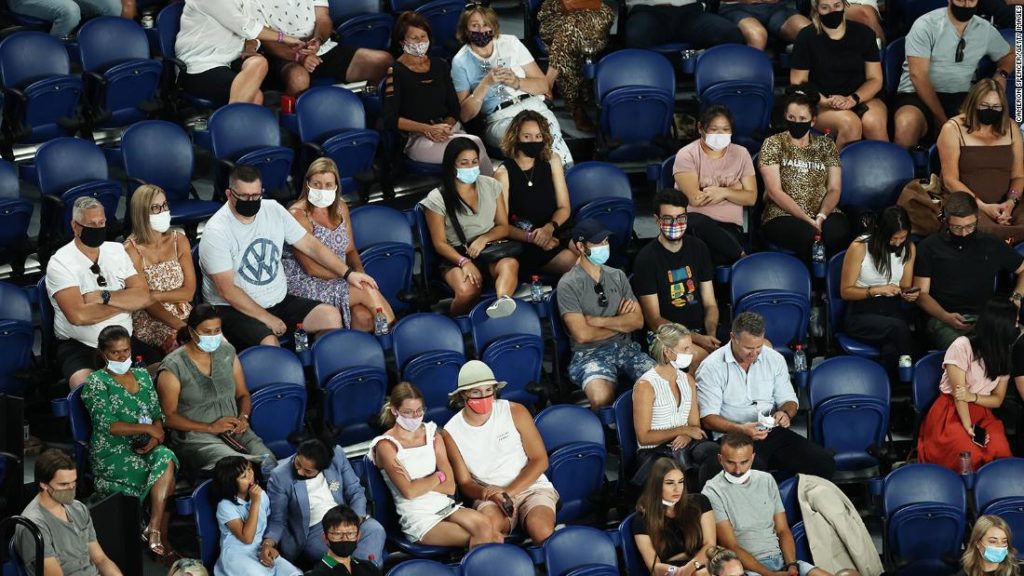Andrews that “this hyper-infectious variant is moving at hyper-speed,” and to stop it the government needed to enact a short, strict lockdown so people do not unwittingly infect others before they realize they have contracted the virus themselves.
“We are facing a new kind of enemy. A virus that is smarter, and faster, and more infectious,” Andrews said of the variant. “Until we have a vaccine, we need to do everything we can to keep this virus at bay.”
Australia has not yet begun rolling out coronavirus vaccines.
“Tennis Australia continues to work with the government to ensure the health and safety of everyone,” the organization said in a statement.
Tennis fans told CNN that attending and hosting the Open, one of Melbourne’s biggest events of the year, was something residents felt they had earned after so many weeks of vigilance. People may still be able to attend the tournament if the lockdown is not extended past 5 days, but the Open’s middle weekend is usually its most popular.
“Today hurts. Victorians know, better than anyone, just how deeply,” he said.
Andrews said people will only be allowed to leave their home for four reasons: shopping for necessities; care and caregiving; exercise; and work, if it is deemed essential by the government.
Shoppers and those going for exercise will only be allowed to travel within 5 kilometers (3.1 miles) of their home, unless they do not live that close to stores.
Most retail businesses will be forced to close, besides essential stores like supermarkets and pharmacies. Restaurants and cafes will be allowed to offer take-away service. And gatherings at private homes and in public are prohibited.
“By limiting our movement, we limit the potential spread of the virus,” Andrews said.
The Open’s hurdles
Victoria’s lockdown is the latest in a series of hurdles organizers of the annual tennis tournament have faced in their efforts to put on a successful event during a pandemic.
The tournament was originally delayed by three weeks, and the government mandated that players coming from overseas would be required to quarantine for 14 days. The initial plan had been to allow players in quarantine five hours a day to practice, but several people linked to the Open tested positive for the virus while in quarantine — forcing 72 players to undergo a more intense quarantine in which they were not allowed to leave their rooms for the full 14 days.
Then, with just days to go before the start of the tournament, a security guard in one of Melbourne’s quarantine hotels tested positive for the virus — forcing his close contacts back into isolation until they were cleared of infection.
Organizers had expect up to 400,000 fans to attend the tournament this year in a socially distanced manner, around half the number that were at last year’s competition, and fans came out in force on Monday for the first day — relishing in the fact that they are some of the few people on the planet able to attend live sports during the pandemic.
As news of the snap lockdown broke on Friday, many games were already underway with fans getting their last glimpse of action for at least five days.
Notably, Serena Williams kept her hopes of a record-equaling 24th grand slam title alive after surviving a minor scare.
The American saved two set points in her match against Anastasia Potapova but recovered to win in straight sets 7-6 (7-5) 6-2.
Speaking of the lockdown after her match, Williams said: “It’s rough. It’s going to be a rough few days for I think everyone. But we’ll hopefully get through it.”
Meanwhile, Naomi Osaka battled past Ons Jabeur 6-3 6-2 to reach the fourth round of the tournament.
Unlike Australia, however, Japan is struggling to cope with rising coronavirus case numbers. Cases have more than doubled in the past two months to more than 406,000, stretching Japan’s medical system to the brink despite the fact that the country has the most hospital beds per capita in the developed world.
CNN’s Chandler Thornton, Angus Watson, Ben Westcott and Paul Devitt contributed to this report
You may also like
-
Afghanistan: Civilian casualties hit record high amid US withdrawal, UN says
-
How Taiwan is trying to defend against a cyber ‘World War III’
-
Pandemic travel news this week: Quarantine escapes and airplane disguises
-
Why would anyone trust Brexit Britain again?
-
Black fungus: A second crisis is killing survivors of India’s worst Covid wave

